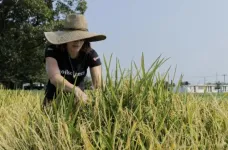(Press-News.org) Cruciferous vegetables, including broccoli, cabbage, kale, and cauliflower have been found to lower blood pressure, in comparison to root and squash vegetables, in middle-aged and older Australian adults with elevated blood pressure.
In a randomised, controlled, crossover trial, researchers from Edith Cowan University (ECU) found that consuming four serves a day of cruciferous vegetables resulted in a significant reduction in blood pressure, compared with four serves a day of root and squash vegetables including carrot, potato, sweet potato and pumpkin.
“Compounds called glucosinolates, which are found almost exclusively in cruciferous vegetables, have been shown to lower blood pressure in animals, but evidence in humans has thus far been limited,” ECU PhD student Ms Emma Connolly said.
Additionally, cruciferous vegetables also contain several other components that likely provide additional benefits in lowering blood pressure, such as nitrate and vitamin K.
“Hypertension, or high blood pressure, is the leading risk factor for heart disease, with its prevalence increasing with age,” Ms Connolly said.
“Increasing vegetable intake is widely recommended to reduce heart disease risk, and previous observational studies have shown, cruciferous vegetables like broccoli, cabbage, and Brussels sprouts, have stronger relationships with lower heart disease risk than other vegetables. However, while these vegetables are consumed globally, cruciferous vegetables typically make up a small portion of total vegetable intake.”
ECU NHMRC Emerging Leader and Heart Foundation Postdoctoral Fellow Dr Lauren Blekkenhorst noted that less than 1 in 15 Australian adults currently meet recommendations for vegetable intake, which has continued to drop over the years.
“Cruciferous vegetables are the lowest consumed group of vegetables. If people can increase their intake of this group of vegetables, they will receive more bang for their buck in terms of in lowering blood pressure and reducing the subsequent risk of developing heart disease later in life.”
“To maintain these health benefits, you should have to ideally consume these vegetables on most days of the week.”
The study was conducted over a six-week period, with participants completing two 2-week dietary interventions, separated by a 2-week ‘wash-out’ period where they followed their normal diet.
During one intervention period participants consumed four serves of cruciferous vegetables per day as soups with lunch and dinner, while during the other intervention period they consumed a root and squash vegetable soup. The blood pressure of participants was measured continuously for 24 hours before and after both 2-week intervention periods and showed a 2.5 mmHg difference in blood pressure reduction for eating cruciferous vegetables compared to root and squash vegetables.
Background diet and lifestyle remained consistent throughout the study, indicating the reduction in blood pressure seen was not influenced by these factors.
This amount of lowered blood pressure can translate to roughly 5% lower risk of experiencing a heart attack or stroke.
The Heart Foundation has welcomed the research results, with Manager for Heart Health, Kym Lang saying the research finding was fascinating.
“The Heart Foundation encourages people to eat a variety of vegetables every day as part of a heart-healthy eating pattern. You can experiment with adding cruciferous vegetables, like broccoli or kale, to your meals.
"The Heart Foundation is proud to have supported this research that builds on the importance of vegetables in a heart-healthy eating pattern. We look forward to continuing to learn more about the role cruciferous vegetables play in heart health."
The research was published in BMC Medicine.
- ends -
Media contact: Esmarie Iannucci, 08 6304 3080 or 0405 774 465
e.iannucci@ecu.edu.au
Journalists can subscribe to get the latest research news delivered to your inbox.
END
Dynamic service migration is a key technology in Mobile Edge Computing(MEC). In a multi-user service migration scenario, the states of all users are combined into a global state, which leads to the instability of the system and ignores the influence of multiple users. It is more and more challenging to design an effective migration strategy to balance migration costs and latency in a multi-user distributed environment.
To solve the problems, a research team led by Degan ZHANG published their new research on 15 August 2024 in Frontiers of Computer Science co-published by Higher Education Press and Springer Nature.
Considering ...
Scientists at Huntsman Cancer Institute at the University of Utah (the U), the National Cancer Institute-designated cancer center for the Mountain West, have made a significant breakthrough in predicting the prognosis of triple-negative breast cancer (TNBC), a particularly aggressive disease. Their research, published in JCO Precision Oncology as part of the TOWARDS study, has led to the development of a new mechanism that accurately forecasts the aggressiveness of TNBC. This advancement could revolutionize the way doctors treat TNBC, allowing them to identify higher-risk patients and tailor precise treatments.
Currently, TNBC lacks reliable methods to predict recurrence after ...
SEQUIM, Wash.—Officials gathered at the Sequim campus of the Department of Energy’s Pacific Northwest National Laboratory today to dedicate DOE’s first hybrid-electric research vessel, RV Resilience.
The event marks the start of a new era of marine energy research at PNNL-Sequim, part of DOE’s Office of Science national laboratory system and Resilience’s new home port. Speakers at the dedication included U.S. Sen. Maria Cantwell, U.S. Rep. Derek Kilmer, Washington State Rep. Steve Tharinger and representatives from DOE and PNNL.
“DOE is focused on ...
ROCHESTER, Minn. — About 8 to 10 million Americans over age 40 have an overabundance of cloned white blood cells, or lymphocytes, that hamper their immune systems. Although many who have this condition — called monoclonal B-cell lymphocytosis (MBL) — do not experience any symptoms, a new study shows they may have an elevated risk for several health complications, including melanoma, a form of skin cancer. The findings, by Mayo Clinic researchers, are published in a new paper in the Journal ...
PHILADELPHIA— The vision of people with a rare inherited condition that causes them to lose much of their sight early in childhood was 100 times better after they received gene therapy to address the genetic mutation causing it. Some patients even experienced a 10,000-fold improvement in their vision after receiving the highest dose of the therapy, according to researchers from the Perelman School of Medicine at the University of Pennsylvania who co-led the clinical trial published in The Lancet.
“That 10,000-fold improvement ...
After the treatment, one patient saw her first star. Another saw snowflakes for the first time. Other patients were newly able to navigate outside of the home or to read the labels on their child’s Halloween candy.
The cause of these seemingly miraculous improvements? A gene therapy developed by University of Florida scientists, which restored useful vision to most patients with the rare, inherited blindness known as Leber congenital amaurosis type I, or LCA1, in a small trial.
Those who received the highest dose of the gene therapy saw up to a 10,000-fold improvement ...
Near the Florida-Georgia border, the Chattahoochee and Flint rivers meet and become the Apalachicola River, which carries freshwater and nutrients downstream to the Apalachicola Bay.
New research led by FAMU-FSU College of Engineering Assistant Professor Ebrahim Ahmadisharaf examined how drought and water volume in the Lower Apalachicola River watershed affect nitrogen and phosphorous, crucial nutrients for a healthy aquatic ecosystem. The study was published in Water Research.
“In watershed systems like this, that are subject to regulations upstream, knowing how the ecosystem reacts to changes helps us manage it effectively,” said Ahmadisharaf, ...
Rice and spinach are staples for babies’ and young children’s diets, but toxic metals and metalloids found in those foods can cause severe health impacts.
In particular, heavy metals such as cadmium, lead, mercury, and metalloid arsenic could delay brain development in babies and young children.
In new research published in the academic journal Environmental Geochemistry and Health, University of Delaware scientists have found that flooded rice fields tend to contain higher amounts of arsenic and lower amounts of cadmium. The drier those rice fields are, the lower the amounts of arsenic and the higher the amounts of cadmium. However, the higher cadmium is lower ...
Using hypertonic saline nasal drops can reduce the length of the common cold in children by two days, according to a study that will be presented at the European Respiratory Society (ERS) Congress in Vienna, Austria [1]. They can also reduce the onward transmission of colds to family members.
The results of the ELVIS-Kids randomised controlled trial were presented by Professor Steve Cunningham from Child Life and Health, University of Edinburgh, UK.
He said: “Children have up to 10 to 12 upper respiratory tract infections, what we refer to as colds, per year, which ...
Vaccination against respiratory syncytial virus for adults over 60 is likely cost-effective by preventing illness, hospitalizations, lost quality of life and deaths, according to new research.
The study conducted by researchers at the University of Michigan and the U.S. Centers for Disease Control and Prevention and published in the journal Vaccine, evaluated newly approved RSV vaccines: Arexvy, manufactured by GSK, and Abrysvo, manufactured by Pfizer. The study did not include a third approved vaccine, Moderna's mRESVIA.
The vaccines are now available to adults 60 and older. The CDC recommends a single ...



